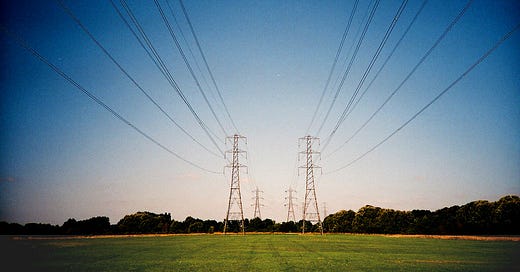Florida's power companies want to raise rates again. Gov. Ron DeSantis' appointees are going to wait until after the election to decide whether they can.
An agency run by Ron DeSantis appointees just punted a potentially unpopular decision until after DeSantis' re-election campaign is done.

This is Seeking Rents, a newsletter and podcast devoted to producing original journalism — and lifting up the journalism of others — that examines the many ways that businesses influence public policy across Florida, written by Jason Garcia. Seeking Rents is free to all. But please consider a voluntary paid subscription, if you can afford it, to help support our work.
Florida’s big power companies want to raise rates yet again.
But the appointees of Gov. Ron DeSantis who will decide whether to let it happen just postponed hearings on the issue — until after DeSantis’ re-election campaign is done.
Florida Power & Light, Duke Energy and Tampa Electric Co. have all asked for permission to increase their monthly electricity rates in 2023. They say they need to charge customers more in order to cover higher-than-expected costs — particularly for natural gas, the fossil fuel that all three power companies are heavily dependent upon.
These rate increases are likely to be substantial. For instance, Duke could add $16 a month to its typical residential bill just to cover its fuel costs — and potentially even more.
And they would also stack on top of another series of record-setting rate increases that all three power companies won just last year from the Florida’s Public Service Commission — a state agency run by political appointees chosen by the governor.
The PSC had originally scheduled hearings to consider these additional rate-hike requests for Nov. 1, 2 and 3. That’s the week before Florida’s Nov. 8 election, in which DeSantis is running for a second term against former Gov. Charlie Crist.
But the PSC decided Friday that it will postpone those hearings until Nov 17 and 18 — after the election is over.
A spokesperson for the agency said the hearings were moved to accommodate people working on recovery from Hurricane Ian, which struck the southwest coast on Sept. 28 and caused widespread destruction across Florida.
“This storm event has required an enormous amount of utility resources, and the additional scheduling time will provide PSC staff and the utilities time to properly prepare for an efficient hearing,” PSC spokesperson Cindy Muir said.
But it’s a decision that also helps DeSantis. Delaying these hearings will likely keep stories about the proposed rate increases out of the headlines while voters are casting ballots in his election.
And that’s significant because the price of electricity in Florida has been an issue in the race for governor — after DeSantis helped the power companies win their last round of rate hikes, which included a $5 billion increase just for Florida Power & Light.
DeSantis enabled those increases by helping to force out a longtime consumer advocate, and by putting a politician and longtime power company ally on the PSC board. Records show DeSantis has raised more than $3 million from Florida Power & Light and a network of big-business front groups and dark-money nonprofits that the company helps to fund.
This isn’t the only potential powder keg that DeSantis and his allies are pushing off until after the election, either.
For instance, DeSantis recently told CNN that he wants to do more to reform Florida’s failing market for homeowner’s insurance, which in collapse even before Hurricane Ian ripped across the state — but not until after the election.
The comment came as the governor confronts growing criticism for his handling of the property insurance crisis. Some analysts say DeSantis ignored the problem for far too long. And others say DeSantis didn’t do nearly enough to help consumers when he finally did confront it.
Now, in DeSantis’ defense, it’s not like there are some easy, pain-free fixes to property insurance just laying around waiting to be passed. Any changes are going to require someone to swallow some pretty tough medicine.
Of course, that’s also why it’s in the governor’s political interests to wait to do anything more until after the election.
Any further reforms the governor makes are likely to include some unpopular changes — such as laws that make it harder to sue an insurance company that denies a claim, or that allow an insurer to charge higher deductibles and cover less damage, or that force rates even higher at state-run Citizens Property Insurance Corp.
But voters won’t learn about any of it until after they’ve cast their ballots.




